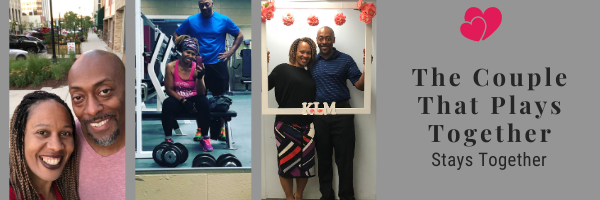7 Healthy Baking Swaps
5 Reasons To Track Your Food
Motivation To Move with LaTara Venise.
Motivation To Move with LaRhonda Nicole
Motivation to Move with Zakiya Kyles
Tips To Kick The Sugar Habit And Lose Weight
Choosing the perfect workout shoe for you.
The Couple That Plays Together, Stays Together
Auto-Immune Disease: A Primer for Us All.

If you are living with an autoimmune disorder: chronic joint or muscle pain, extreme fatigue, difficulty sleeping, weakness, nausea, headache, and depression – are all symptoms you may experience. Autoimmune disorders currently effect 50 million Americans and are becoming more common, but you can significantly reduce your risk by avoiding environmental toxins, eating an anti-inflammatory diet, maintaining a healthy weight, and getting enough sleep at night.
If you are living with an autoimmune disorder: chronic joint or muscle pain, extreme fatigue, difficulty sleeping, weakness, nausea, headache, and depression – are all symptoms you may experience.
Your lifestyle and environment, not your genes, are the main determining factors in your risk of autoimmune disease.
Autoimmune disorders develop when the immune system, that is designed to protect us from disease and infection, mistakenly attacks healthy cells. It’s like your body declares friendly fire on itself and begins attacking normal cells as though they were invading bacteria or viruses. Arthritis, Hashimoto’s, Crohn’s Disease, Graves’ disease, lupus, Sjögren’s syndrome and multiple sclerosis may be the autoimmune disorders you are most familiar with hearing but there are many more.
Many sufferers go through periods when they are symptom free and then have a sudden onset of symptoms known as flare-ups. These can throw a frustrating wrench into your health and wellness plans. Do you suffer from an autoimmune disorder? Has this been your experience too?
Even if you have not been diagnosed with an official autoimmune disorder, if you suffer from similar symptoms, the following suggestions will help. When we take personal responsibility for our wellness things improve. Moderate, low-impact exercise, strength training and flexibility and balance work can do amazing things for your quality of life. Exercise boosts physical energy, which causes the release of endorphins, which are natural painkillers. In addition, movement and physical activity can reduce inflammation throughout the body. The better you feel, the more depression and anxiety will lift. Creating a strong body, leads to a strong mind and strong soul. This is a win-win-win.
Here are some tips for exercising with an autoimmune disorder or even when you do not have an official disorder but experience some of the symptoms I have listed above.
1.Go at Your Own Pace
This one is big and one that I stress to the ladies that join me virtually for workout classes. Start slowly and work your way up in your workouts. Modify the exercise moves by listening to your own body. You don’t have to lift your leg up waist-high if your current range of motion is only half a foot off the ground. You do not have to do push-ups on the floor, you can do wall push-ups instead. Use a chair for balance. Where possible, do some exercise moves sitting down instead of standing up. Go at your own pace. Some days may be harder than others, and so I encourage you to adjust accordingly. Challenge yourself enough to get your heart rate up, but not so hard that you trigger a physical flare.
2. Have A Good Support System
Before starting and during exercise, I always encourage you to talk to your trusted health care provider. As your fitness trainer, I am here to support you and work alongside what your doctor recommends. We are all in this together. Have fun with it. All members of the family can take part in the virtual studio together, so get your family to join you. Hold each other accountable and make a friendly competition out of it.
3. Keep an Activity Journal
Keep track of your fitness. Write it out in a journal, or if you are techy, use an app, a Fitbit or an Apple Watch to help you keep track of your movement. Do you see any patterns emerge for when you have the most/least energy? Bring your results with you to the start of the 6 Week Warrior Woman: Autoimmune so we can look over them together and create a personalized game plan to propel you forward.
4. Pour Out of A Full Cup
Especially when you are battling autoimmune issues, you only have so much energy available to spend. So, you need to budget your time and energy wisely. Don’t overwhelm yourself with a laundry-list of to-dos. Prioritize your self-care activities. Replenish your strength and energy as well as your mental and emotional reserves. Get enough sleep.
5. Extinguish the Flame
Consider an anti-inflammatory diet. Food is fuel and so to keep your body strong, you need to eat well. When your autoimmune system is on the fritz, it is important to monitor what you eat so that you reduce and not increase the inflammation in your body. You want to eat lots of whole, nourishing and healing foods. Fruits and vegetables, drinking plenty of water and incorporating Omega 3’s and fatty acids into your diet. You will want to avoid lactose, red meat, processed sugars, deep-fried foods and white flour – which all increase inflammation. When we work together, we can come up with recipes and foods that work best for you. Afterall, you want to live life to the full and eat good, flavorful food, right?
6. Reduce Stress
Stress is a huge enemy of the immune system. A continued state of fight or flight is not good for our bodies so when we reduce our stress our bodies can recover. Quiet time with God, meditation on the Word of God or scripture, stretching and mobility work, essential oils, herbs and massage therapy are all great ways to reduce stress.
Ultimately, I advocate taking a holistic approach to dealing with autoimmune disorders. This can be done by doing the things we talked about above and improving diet, getting adequate sleep, and sometimes by taking select supplements as suggested by your health care provider. I am motivated by knowing that there is help. There are things you can do to ease your symptoms and support your medical team in treating your condition. If you would like more information on how I can partner with you to create strong, healthy, healing routines and habits, simply shoot me an email of a message at: SisterhoodofStrong@gmail.com or www.Facebook.com/SisterhoodOfStrong

